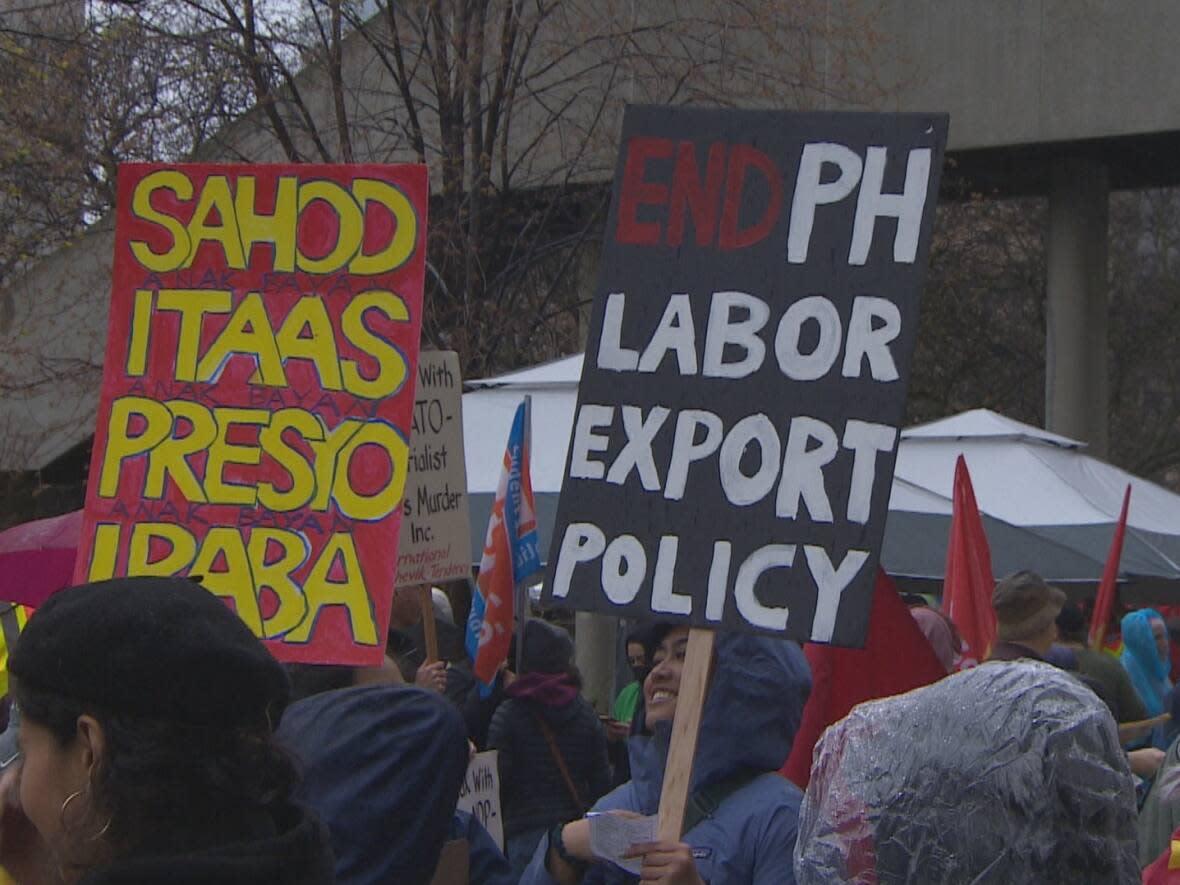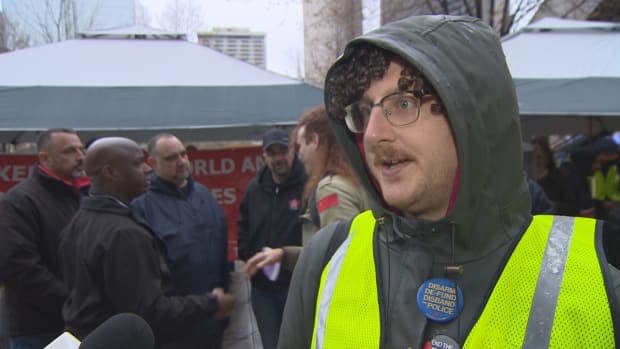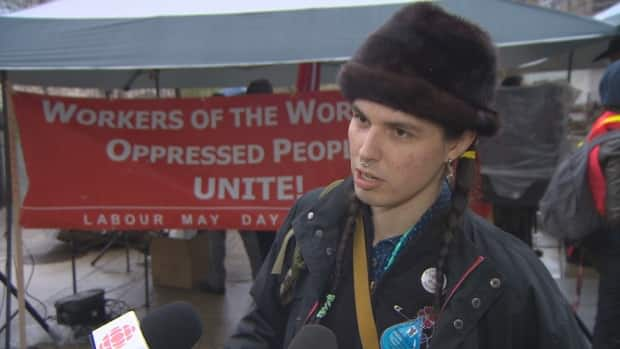Unions, advocacy groups call for better treatment of workers ahead of May Day

Dozens of unions and advocacy groups gathered in downtown Toronto on Sunday to commemorate and celebrate International Workers' Day while calling for better treatment of workers.
Daniel Tarade, chair of the Labour May Day Committee, said the "struggle" continues to build unity among workers and oppressed peoples and to build collective power to fight for what they deserve.
"Coming out of the pandemic, which isn't over, we've seen workers constantly facing safety at work, death at work," Tarade told CBC Toronto, ahead of workers' day which is marked officially on May 1.
"With the inflation crisis, we know it's just getting harder to get by. Rent [is] skyrocketing, food [prices are] skyrocketing, wages have not kept up with either the inflation and the cost of the goods we need to buy or in terms of the productivity of the working class as a whole.
"We're getting swindled here by a very tiny [part] of society that is making billions off of our collective work, and so it's getting harder and harder," he added.

Sunday's event started with a rally at Nathan Phillips Square, followed by a march to Queen's Park.
Tarade said with a recession looming, workers and oppressed peoples are going to be the ones "thrown to the wolves."
"We're gonna be the ones evicted from our homes. We're gonna be the ones relying on food banks," he said.
Workers need to be supported, union president says
ATU Local 113 president Marvin Alfred said workers need to be supported against governments and against organizations that treat them "as a disposable or renewable resource."
"We need support, we need safety, we need funding, we need to not have to beg in order to be kept in the workplace," he said.
Alfred said unions need governments, "especially the federal and provincial governments, to provide resources and not have them cut things like safety as a mechanism [for] making ends meet.
"The public is tired of being mistreated by how they're not paying attention to the core elements of safety," he said.
Rin Simon, who is Anishinaabe and from the Niagara Region, said they made the journey to Toronto to support "people who are fighting for their working rights, which is really important in today's society."

"As Native people, we're forced to engage in a working class that is very predatory toward us," Simon said.
"We're all human beings here together. It's about having a fair and just relationship."
'Working hand-in-hand with labour unions': Ford
On March 21, Ontario Premier Doug Ford said his government was working with labour unions, as he announced the provision of $224 million to build and upgrade training centres to help tackle the province's labour shortage and get more people into careers in the skilled trades.
"As our population grows, we're working hand-in-hand with labour unions, business groups and our colleges and universities to train the skilled workforce that will build the roads, highways, houses, public transit, hospitals and schools our economy needs. It's all hands on deck," he said.

Monte McNaughton, Minister of Labour, Immigration, Training and Skills Development, also spoke during the March 21 announcement.
"Ontario is facing the largest labour shortage in a generation, which means when you have a career in the skilled trades, you have a career for life," he said.
According to the Ford government, nearly 300,000 jobs are going unfilled across the province, costing billions in lost productivity.
Tightening labour market
Rafael Gomez, the director for the Centre for Industrial Relations and Human Resources at the University of Toronto, said the shortage of workers in several industries has resulted in workers making gains.
He said prior to the COVID-19 pandemic, "there was actually evidence that the tightening of the labour market was bringing about rises in wages for the first time."
Gomez said those increases were in the non-union private sector, which is where the labour shortages were showing up.
"Private sector non-union wages were rising much faster than unionized wages in either the public or private sector," he said, adding, "that was an indication that there [were] these labour market pressures in the non-union context being shown up in higher wages in the case of workers."
In the unionized sector, Gomez said the tightening of the labour market also favoured things like organizing drives.
"You can threaten workers with job closures, or they lose their jobs if [they] join the union, [or] there won't be room for everyone in the union after wages go up," he said. "That often derails an organizing drive to form a union here in Canada or the U.S., but actually we saw small indications that a lot of these organizing attempts were becoming more successful.
"However, overall, the union percentage in both economies hasn't budged. In fact, it's still gone down as a percentage of all workers in Canada and the U.S.," Gomez added.
The winning side
Meanwhile, Gomez says if a strike occurs or if something in the negotiation process goes wrong, the side that has been winning over the last several years "has shifted to labour."
He said the length of strikes by unionized employees — notwithstanding the current strike by public sector workers which entered its 12th day on Sunday — usually only lasts a few days.
"When strikes last that little time, it usually means that labour has won," Gomez said.
"They've got their demands and the strike hasn't imposed a big cost on the workers. The problem with the strike is if it goes on too long, the labour party could win, but in fact have lost materially because you'll never make up the amount of wages lost in those intervening weeks."


